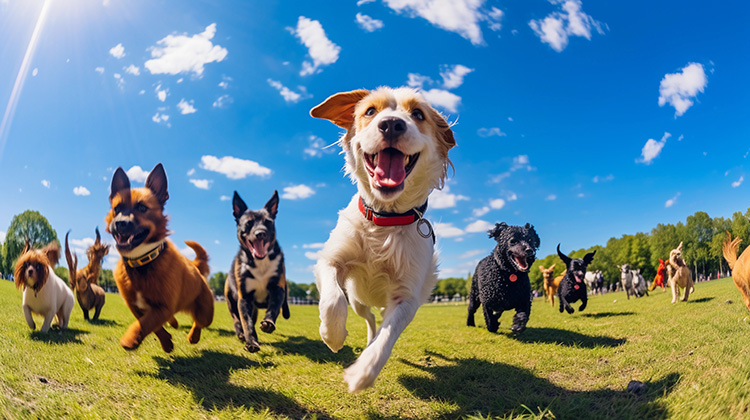In a puppy’s life, there are windows of opportunity for important events. If the puppy has positive experiences at these times, she will develop to her potential. If she doesn’t experience life at an early age, her psychological growth is stifled, and she’ll be fearful in new situations. An extremely respected fellow trainer recently said to me that the word “socialization” is often misinterpreted. A better word than socialization is “neutralization.” Because it isn’t absolutely necessary that a puppy be everyone’s new best friend or play with every other dog in the dog park. But what is necessary is to expose a puppy to the “S’s” in life; Sights, Sounds, Smells and Surfaces.
Socialization or neutralization – the exposure to people, places, and activities – is critical to a dog’s psychological development. From the age of 9 or 10 weeks onward, a puppy must meet people, go places, learn and experience things, live life! Neutralization must start before four months of age, and continue into adulthood. In the absence of this critical, on-going exposure, dogs develop fear of the unfamiliar – or “neophobia.” Additionally, if you bring a puppy home and already have a dog, it is important to remember that the puppy will imprint on the dog instead of you. It is critical that from 8-12 weeks of age the dog has more human contact than dog contact.
Unsocialized dogs often seem normal in familiar surroundings, which is why many rescues tell potential families that the dog is friendly. In a familiar environment they act like a normal dog. But take them out of those comfortable surroundings, and they can’t adjust. They have been deprived of the opportunity to develop coping skills learned through socialization.
The saddest part is that this is 100% preventable. All that someone has to do is spend a little time providing their new puppy with new experiences. That’s all – just some time and attention with a young dog.
So what can someone do if they find that they have a dog with no social skills? There is no one scenario that fits all unsocialized dogs. I’ve seen successes and failures – with no pattern.
I’ve worked with unsocialized dogs, gently and repeatedly exposing them to experiences, and have seen dogs make a complete reversal – learning to enjoy life. With gentle, positive experiences, through learning simple behaviors in a totally positive way, some unsocialized dogs do learn to learn. The devoted family must introduce new, unstressful experiences very gently so the dog gradually learns to cope. It’s critical that training be totally non-punitive, and the family watches for and respects “calming signals.” We also have a couple of special dogs on “staff” that act as calming dogs for dogs that have little or no socialization.
There are no guarantees that this approach will work, however. Even though a new family is ready to give the dog all the love and attention in the world, the unsocialized dog may be incapable of accepting it.
So if you are considering a new puppy and you simply don’t have the time to do all of the work that goes along with training and socializing your puppy. In that case, or if you have a dog at home already, we encourage you to consider our in-house 4-Week Puppy Training Package. I know it seems impossible to be without your little treasure for a month, but trust me he will come home and give you a lifetime of wonderful companionship. It’s those first few weeks that are so incredibly critical. Let the trainers at The Dog Knowledge do the hard part.


